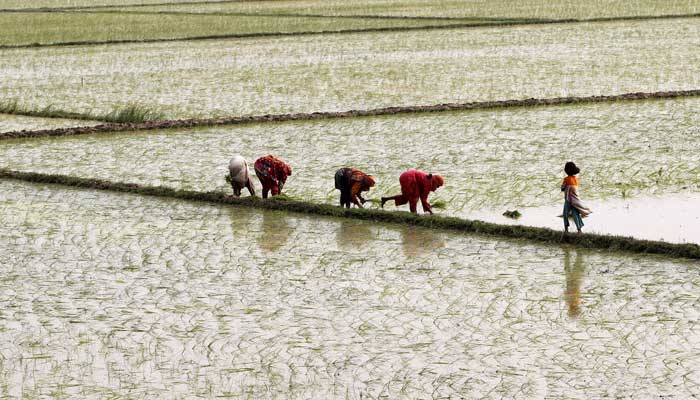Beyond banking, sowing change
Despite contribution of around 24% to GDP and employment for nearly 38%, agricultural sector is marked by distressing yield inefficiencies
November 26, 2025

Pakistan's agricultural sector, the cornerstone of rural livelihood and national food security, is teetering on the edge of a historic precipice.
Despite its sectoral contribution of approximately 24% to GDP and employment for nearly 38% of Pakistan’s workforce, our agricultural sector is marked by distressing yield inefficiencies, jeopardising both economic growth and poverty reduction.
Mounting pressure is building as the country’s population surges ahead of food production, with growth rates for key crops like wheat, rice, cotton and sugarcane stagnating or declining.
This trajectory is deeply worrying. As the nation looks to the future, the conversation must transcend simply providing financial support: we must look beyond banking and move towards sowing change.
Pakistan's food security challenge comes into sharp focus when you look at the numbers. In 2025, total cereal production, including wheat, rice and maize, was 47.27 million tonnes, with yields of 3.63 tonnes per hectare, well below the South Asian average of 4.29 tonnes per hectare and far behind the 6.92 tonnes per hectare seen in developed economies.
Over the past decade, our population has grown by about 28%, but cereal yields have risen by only 21%. The result is a widening gap between what we produce and what we need.
Because production is not keeping pace, wheat has accounted for roughly 7.0% of total food imports over the past three years.
Even raw cotton, traditionally an export, now accounts for 4.0% of total imports, eroding precious foreign exchange. With yields still almost 30% below global productivity levels, the pressure on Pakistan’s food system is no longer a distant concern but an urgent economic and social fault line.
For years, policymakers and financial institutions have emphasised credit and loan schemes as the backbone for agricultural progress, and some have even championed this as a "sole" solution. While there has indeed been an increased emphasis on banks stepping forward in response, making significant headway in expanding access to finance amongst farming communities (particularly through subsidies and micro-lending programs), the reality on the ground tells a different story.
In 2025, Pakistan’s agricultural growth has slowed to just 1.51%, trailing the regional South Asian average of 3.6%. As we face the many unprecedented phenomenon of climate change, modern agriculture demands an integrated approach. Alongside credit, the necessary transformative levers are mechanisation, technology adoption, rigorous training, seed sciences, safe pesticide usage and digital innovation. These are missing from the equation.
Only 5-10% of farmers in Pakistan utilise mechanical equipment or digital platforms for market intelligence, leaving a vast majority relying solely on traditional methods and remaining disconnected from pricing trends and weather data. This means over 90% of our farmers are ploughing the future with tools of the past.
Fostering real progress in agriculture cannot rely exclusively on expanding credit. True agricultural advancement can only be achieved when mechanisation, technology, scientific training and the use of AI tools for weather predictability and resource management are at the heart of the national agenda. This requires moving beyond banking towards a model where financial support is closely interwoven with a push for innovation, capacity-building, and knowledge-sharing.
Mechanised farming, using harvesters, seed drills, planters and automated irrigation systems, drastically reduces manual labour and input waste and enhances both crop quality and yield; the adoption rate in Pakistan, however, remains suboptimal. Smart farming technologies such as digital farming apps, sensors, Geographic Information Systems (GIS), and AI-powered weather and pest prediction apps remain in the early stages of assimilation for most farmers.
Wider deployment of such technology, supported by robust extension services and ongoing training, can optimize field-level resource use and allow for real-time, data-driven decisions that boost productivity and sustainability. Globally, agriculture is becoming a data-driven industry powered by satellite mapping, digital soil testing, and drone imagery. Agricultural technology is no longer about convenience: it is about survival.
Equally essential is water management. Somewhere between 40 and 60% of Pakistan's irrigation water is lost due to inefficiencies in the agricultural system, with losses occurring both during conveyance through canals and application in fields. Since agriculture uses over 90% of the country's freshwater, this significant waste is one of the major contributors to Pakistan's water crisis.
With recurring droughts and chronic water shortages, the future of Pakistan’s agriculture depends on advanced irrigation practices, soil moisture sensors, and AI-driven tools for efficient water distribution and conservation. These advancements would help farmers not only increase yields but also safeguard increasingly scarce natural resources against the impacts of climate change.
Finally, women contribute more than 60% of agricultural labour in Pakistan but have limited access to finance or training. Any model for transformation cannot ignore women farmers and must be gender inclusive. Empowering women in agriculture will multiply production instantly.
Food security for the coming decades hinges on this multipronged evolution. As Pakistan’s population approaches an estimated 350 million by 2047, the demands on the food system will multiply. Only by investing in mechanisation, promoting technology adoption and empowering all our farmers through continuous training and support can Pakistan hope to reverse declining crop outputs, close the gap with regional peers, and secure a more resilient agricultural future.
"Beyond Banking, Sowing Change" must be more than a slogan — it must become a strategy, a national movement, that commits Pakistan to ensuring that agricultural policy, public and private investment and community efforts are all aligned in pursuit of higher yields, smarter farming, water conservation and long-term food security.
The writer is the chairman of Habib Bank Limited (HBL).
Disclaimer: The viewpoints expressed in this piece are the writer's own and don't necessarily reflect Geo.tv's editorial policy.
Originally published in The News











